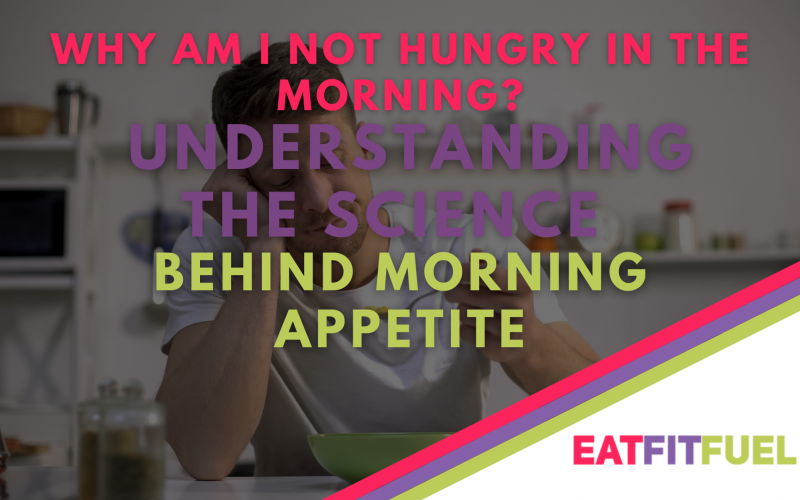We all know how important breakfast is for our health. In fact, we’re told that it’s the most important meal of the day. However, a lot of people struggle with a lack of appetite first thing in the morning. Lack of hunger in the morning is caused by various physiological and lifestyle factors.
In this article, we’ll explore the science behind morning appetite. We’ll also tell you how health conditions, hormonal changes, medications, eating habits, cortisol levels, and circadian rhythms impact hunger in the morning. While it’s normal not to feel hungry first thing in the morning, understanding the root cause is key.
We’ll also give you tips to help you determine if your lack of hunger is problematic and needs medical attention. We’ll offer simple solutions to help stimulate your appetite. Let’s now delve into the discussion.
Overview
Understanding the Reasons Behind Not Being Hungry in the Morning
Medications and Chronic Conditions
- Chronic Conditions
- Medication
Stress and its Impact on Appetite
How to Boost Your Appetite in the Morning
- Manage Stress Levels
- Eat Something Small
- Deep Breathing
Why Am I Not Hungry in the Morning? Understanding the Reasons Behind Not Being Hungry in the Morning
Whether you’re hungry enough to have breakfast in the morning or not is individual and perfectly normal. But in some cases, lack of hunger in the morning may be a sign of a serious issue. So why am I not hungry in the morning and what reasons could be causing a lack of appetite in the morning? Let’s examine them below.
1. Natural Hormonal Fluctuations
A healthy appetite is an important part of life. It increases our desire to eat, allowing us to get the right amounts of nutrients.
So, how does our appetite work? Usually, the body recognizes our need for food when we’re hungry and sends signals to the brain through a rumbling stomach. This is where hormones come in as they help to regulate the body’s appetite.
Hormonal fluctuations play an important role in appetite and hunger, with Ghrelin, a hunger hormone stimulating your appetite. This hormone is involved in the regulation of food intake and the balance of energy. Its levels fluctuate naturally throughout the day with lower levels in the morning, leading to a loss of appetite during breakfast.
There’s also the leptin hormone that tells your brain when you’ve had enough food. Many factors affect the regulation of these hormones, hence interfering with a person’s appetite drive.
A lot of people experience a loss of appetite at one point or the other, after a morning snack, including during breakfast. Hormonal changes resulting from environmental factors, medication, and psychological, or physical conditions can play a big part in this.
2. Overeating at Night
Eating a large dinner or having a late-night snack is one of the reasons why you may not feel hungry in the morning. That’s especially the case if you eat a high-protein or high-fat meal whose macronutrients slow down digestion, making you feel fuller for much longer. Fat takes even longer to digest, causing you not to have the appetite for breakfast.
Foods rich in protein and fat also trigger the hormones that suppress appetite and promote fullness. Protein, for instance, can alter levels of ghrelin, glucagon-like peptide-1, and cholecystokinin that regulate appetite. As for high-fat meals, the fat can alter levels of peptide YY (PYY), another hormone that plays a role in appetite.
It’s important to note that timing your evening meal accordingly will help to prevent this occurrence when you wake up in the morning. Ideally, it’s recommended that you stop eating at least three hours before bedtime. This helps to give your body the time to digest the food.
Medications and Chronic Conditions
1. Chronic Conditions
Loss of appetite can either be physical or psychological. This can be temporary depending on factors such as infections or issues, and soon after, a person’s appetite is back.
You can also lose your appetite due to long-term medical conditions like cancer. This is part of a condition that’s referred to as cachexia in medical terms. If the loss of appetite happens over an extended period, doctors call it anorexia.
Below are the medical conditions that can lead to a loss of appetite:
- Respiratory infections: Resulting from having a flu or cold.
- Depression: It causes changes in eating habits and a loss of interest in food.
- Gastrointestinal conditions: Such as celiac disease, Crohn’s disease, or even ulcerative colitis.
- Underactive thyroid (hypothyroidism): Occurs when the thyroid gland fails to produce enough thyroxine hormones, useful for metabolism.
- Anorexia nervosa: An eating disorder that’s characterized by an intense fear of gaining weight, leading to self-starvation.
- Aids: This can also lead to a loss of appetite due to the treatment.
2. Medications
Loss of appetite can also be a side effect of certain medications combined with digestive issues like constipation and diarrhea. This is especially common when going through the stomach and the digestive tract.
Some of the medications and treatments include sedatives, chemotherapy, immunotherapy, and radiation therapy to the stomach area. There are also antidepressants that cause changes in appetite and weight, as well as pressure medications that cause nausea and vomiting.
Note that people who have recently undergone surgery can also experience a loss of appetite, a feeling that’s partly related to anesthesia drugs.
Stress and its Impact on Appetite
Experts believe the reason we don’t feel hungry in the morning is lifestyle-led. Waking up without an appetite could mean you’re running on a stress hormone called cortisol.
When sleeping, the body is usually in an overnight fast where it has to use the glucose reserves stored in the liver. This helps it maintain the blood sugar balance, a process that lasts the body up to around eight hours, and the stores are used up. The cortisol hormone released by our adrenal glands manipulates blood sugar by breaking down muscles to keep us going.
When we are stressed, the stress delays appetite hormones, especially if the stress is a chronic condition. Cortisol helps us to get up and get going in the morning. But with chronic stress, there’s usually a reduction in the production of cortisol in the morning, which impacts appetite and energy levels, leading to serious morning sickness and lack of.
When to See a Doctor
Keep in mind that a continued loss of appetite can lead to weight loss and even malnutrition. That’s why it’s important you find out the reasons for your loss of appetite because leaving it untreated can be dangerous.
If you’ve been experiencing a loss of appetite for a long time, it’s crucial you talk to a doctor about it. You also need to see a doctor if you notice an unexpected or rapid weight loss due to a lack of appetite. Below are other symptoms that sometimes accompany loss of appetite, and you must see a health when you notice them:
- Fever
- coughing
- Stomach pain
- Shortness in breath
- A rapid or irregular heartbeat
Let’s now get into the discussion of how you can boost your appetite in the morning.
How to Boost Your Appetite in the Morning
1. Manage Stress Levels
If you think that stress is the cause of your lack of appetite or you’re too nauseous, begin your day with a glass of warm water with fresh ginger and lemon. It will help to kickstart the liver function.
But if stress is the likely contributor, consider finding ways of managing it and supporting your body to relax. Start your day with a small breakfast and take small steps into rebalancing the body’s nervous system for your morning appetite to return.
2. Eat Something Small
It’s to note that there’s no right or wrong time to have a big meal for breakfast as long as you’re fuelling your body properly. Moreover, it’s not uncommon to lack an appetite skipping breakfast first thing in the morning.
But if you’re not hungry for several hours after a hearty breakfast, taking a shower, and getting ready for the day, then it’s time you consider a nutrient-dense snack. This will help to kickstart your appetite, ideally within 90 minutes of waking up
3. Deep Breathing
A little morning zen will help to kickstart your day. Breathe in for four seconds and hold your breath for another four seconds. These breathing exercises will help to regulate cortisol hormones and get you back to your morning appetite.
Wrapping Up
A lack of appetite in the morning can be attributed to various factors including, natural hormonal fluctuations, overeating, having a late snack the previous night, medications, or chronic conditions. Stress is also a significant contributor to changes in appetite, and as such, it must be managed.
To ensure a balanced and nutritious diet, consult a nutritionist and any other experts who can address possible underlying causes of your lack of appetite. By understanding the reasons behind your lack of appetite in the morning, you can take the right measures toward improving your overall health and well-being.






